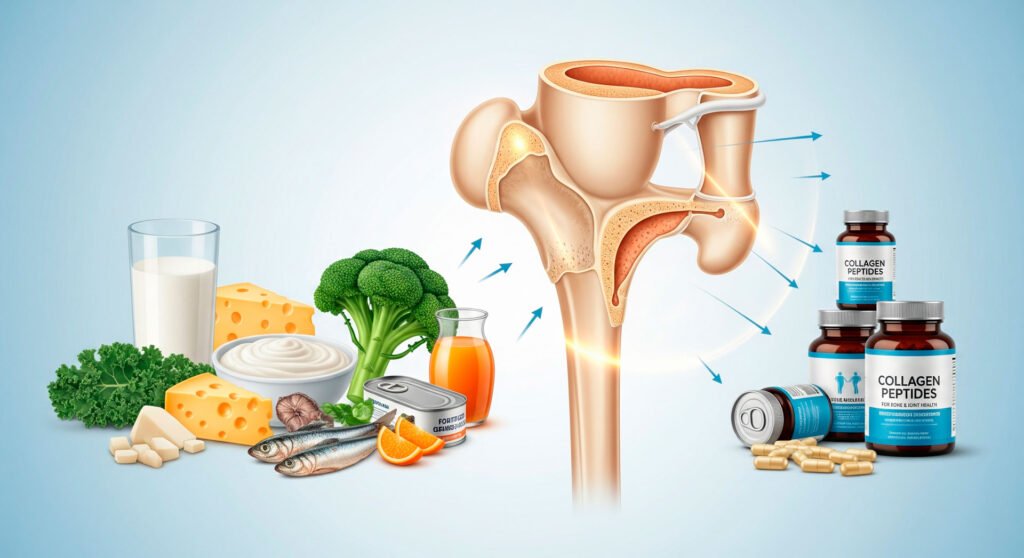Page Contents
ToggleHave you noticed your skin losing its bounce or your joints feeling creakier than they used to? If you’re between 30 and 60, you’re experiencing what happens when your body’s collagen production naturally declines. The good news is that understanding collagen benefits can help you take proactive steps to support your body’s most abundant protein. Let’s explore what science tells us about this vital nutrient and how it can help you maintain vitality as you age.
While collagen builds the internal structure of your nails and skin, protecting them from external threats like fungus is equally important for maintaining that vitality. For a solution designed to penetrate and protect these tissues using nanotechnology, read our full review of NanoDefense Pro.
Understanding Collagen Benefits for Your Body
Collagen is the structural protein that acts like scaffolding throughout your body, making up about 30% of your total protein content. Think of it as the glue holding everything together – from your skin and bones to your muscles and blood vessels. Your body produces collagen naturally, but this production drops by about 1% per year after age 20, accelerating in your 40s and beyond.
There are at least 16 types of collagen, but types I, II, and III make up 80-90% of the collagen in your body. Type I supports skin, bones, and connective tissues; Type II is crucial for cartilage; and Type III works alongside Type I in skin and blood vessels. Understanding these differences helps you choose the right supplementation approach for your specific needs.
For joint health in particular, supplements that combine collagen with other ingredients can make a real difference. Our Joint Genesis Review 2025 highlights one such formula designed to restore mobility and flexibility as you age.
Skin Health: Visible Signs of Improvement
One of the most researched areas of collagen supplementation involves skin health. Clinical studies show that taking collagen peptides for 8-12 weeks can increase skin elasticity, hydration, and density. Women in their 40s and 50s often report visible improvements in fine lines and overall skin texture.
The science behind these improvements is compelling. Collagen peptides stimulate your body’s own collagen production while providing building blocks for new collagen formation. Research participants taking 2.5-5 grams daily showed:
- Reduced wrinkle depth by up to 20%
- Increased skin moisture by 28%
- Improved skin elasticity by 18%
- Enhanced overall skin appearance
These aren’t overnight miracles, but gradual improvements that help you look as vibrant as you feel.

However, if your skin or nail concerns stem from persistent fungal infections rather than just aging, you might need a more targeted approach. Our in-depth analysis of NanoDefense Pro explores a formula that addresses these stubborn issues at the root.
Joint Support and Mobility Enhancement

For active adults dealing with joint discomfort, collagen offers promising joint support. Type II collagen specifically targets cartilage health, potentially reducing pain and improving mobility. Studies focusing on athletes and older adults with joint issues show significant benefits.
A 24-week study found that participants taking 10 grams of collagen daily experienced reduced joint pain during activity and at rest. This is particularly relevant if you’re trying to maintain an active lifestyle but find yourself limited by joint discomfort. Many people report being able to return to activities they’d given up, from gardening to hiking.
If joint stiffness or reduced mobility is affecting your quality of life, consider exploring our Joint Genesis Review 2025, where users share how the supplement has supported their flexibility and reduced discomfort.
Bone Density and Strength Maintenance
As we age, maintaining bone density becomes increasingly important, especially for women approaching or past menopause. Collagen makes up about 90% of bone matrix proteins, providing the framework for calcium and other minerals to attach.
Research indicates that collagen supplementation, particularly when combined with calcium and vitamin D, can help slow bone density loss. A year-long study of postmenopausal women showed those taking collagen peptides had significantly less bone density decline compared to the control group. This translates to real-world benefits like reduced fracture risk and maintained independence as you age.
Collagen works best when combined with other nutrients that support connective tissues. Learn how Joint Genesis leverages hyaluronan and anti-inflammatory botanicals alongside collagen in our Joint Genesis Review 2025.

Best Sources: Food vs. Supplements

While supplements are popular, understanding the best sources of collagen helps you make informed choices. Food sources include:
- Bone broth (highest natural source)
- Chicken skin and cartilage
- Fish with skin
- Egg whites
- Citrus fruits and berries (vitamin C for collagen synthesis)
However, getting therapeutic amounts through diet alone can be challenging. This is where supplements bridge the gap. Marine collagen is often preferred for skin benefits due to smaller particle size and better absorption, while bovine collagen works well for joint and bone support.
The concept of particle size is also crucial for treating topical issues like nail fungus, where absorption is often the biggest hurdle. To learn about a formula that utilizes nanotechnology for deep penetration, see our complete breakdown of NanoDefense Pro.
Proper Dosage for Optimal Results
Research suggests different proper dosage amounts depending on your goals:
- For skin health: 2.5-5 grams daily
- For joint support: 10-40 grams daily
- For bone density: 5 grams daily
- For muscle mass: 15 grams daily
Most studies show benefits appearing after 8-12 weeks of consistent use. Taking collagen on an empty stomach may improve absorption, though some people prefer taking it with vitamin C-rich foods to enhance collagen synthesis.
To get the most from your supplement routine, check out our Joint Genesis Review 2025, which explains how collagen can be paired with synergistic ingredients for even stronger results.
Potential Side Effects and Considerations
While generally safe, being aware of potential side effects helps you use collagen responsibly. Most people tolerate collagen well, but some may experience:
- Mild digestive discomfort
- Feeling overly full
- Unpleasant taste (with some products)
- Allergic reactions (rare, usually with marine sources)
People with fish or shellfish allergies should avoid marine collagen. Those with dietary restrictions should check sources carefully – bovine collagen isn’t suitable for vegetarians, and no true vegan collagen exists (though vegan “collagen boosters” are available).
Quality matters significantly. Look for hydrolyzed collagen or collagen peptides, which are broken down for better absorption. Third-party tested products ensure purity and potency.
The journey to healthy aging doesn’t require dramatic measures. Incorporating collagen benefits into your wellness routine offers a science-backed approach to maintaining skin elasticity, joint comfort, and bone strength. Whether through dietary sources, quality supplements, or both, supporting your body’s collagen needs can help you feel confident and capable at any age. Remember, consistency is key – give your body time to rebuild and regenerate. With patience and the right approach, collagen can become a valuable ally in your natural health journey.
Sources
This article was inspired by and adapted to better serve the readers of Best Natural Health Products from “What Is Collagen, and What Is It Good For?”. Healthline. Available at: https://www.healthline.com/nutrition/collagen. Accessed on: September 9, 2025.
Sarah Jenkins is a Senior Wellness Researcher and former science educator. She specializes in "Ingredient Provenance"—decoding complex clinical studies to ensure every product is safe and historically verified. Sarah translates dense medical data into actionable advice for families and individuals.
